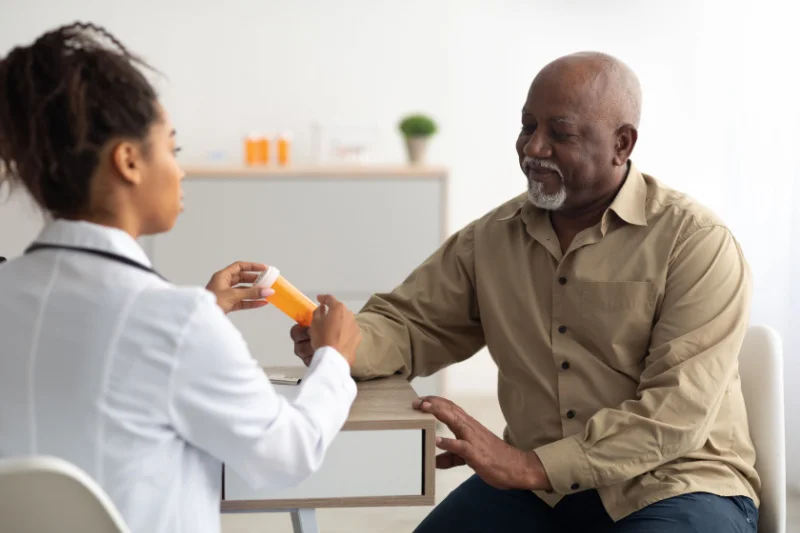The Basics of Medication-Assisted Treatment (MAT)
Mediation-assisted treatment (MAT) is one of the most common and effective forms of substance abuse rehab when done properly under the supervision of medical personnel. MAT is an umbrella term used to describe a wide variety of substance use disorder treatments that involve the use of medicines to fight aspects of drug, alcohol, and opioid addiction.
According to psychiatric mental health nurse practitioner (PMHNP) Valerie Puffenberger, the biggest benefits of MAT include:
- Relief from the pain of withdrawal symptoms
- Reducing the potential for a relapse and/or relapse
- Reduction in cravings
- Increased levels of participation and retention of patients in treatment
Some forms of medication-assisted treatment are considered very controversial in the field, but most forms are widely, if not universally accepted. However, medication-assisted treatment is generally not considered sufficient if used alone. Rather, it is only effective when combined with other forms of treatment such as individual and group therapy, support groups, and either inpatient or outpatient rehab.
How Medication-Assisted Treatment Works
There are many forms of medication-assisted treatment; each of which works in a different way. In fact, there are enough forms of MAT to fill a whole book, far too many to cover in a short time. However, it is possible to place different types of MAT into general categories that can be easily explained.
MAT for Emergency Care
Tens of thousands of Americans die every year from drug overdose or alcohol poisoning (another term for alcohol overdose). Luckily, a number of medications have been developed for the emergency treatment of overdose.
In some cases, such as Naloxone/NarCan, the drug actually reverses the effects of the overdose. Other drugs, such as anti-seizure medications, reduce symptoms or help stabilize the patient.
In any case, MAT for emergency care is designed to save the patient’s life and prevent injuries/complications.
MAT for Withdrawal and Rebound Symptom Relief

When an individual is dependent on a substance, their body has become so adapted to its presence, that they will experience a wide variety of unpleasant withdrawal symptoms if they stop using or decrease their dose.
At the same time, the individual may also experience what are known as rebound symptoms, or the return of any symptoms or conditions that the substance treated. For example, anxiety is a common rebound symptom of Xanax. Rebound symptoms are often more severe than those that were initially present.
Most medications that are used in MAT help alleviate or eliminate withdrawal or rebound symptoms.
Withdrawal can be very challenging to get through, and many individuals give up. Those that do complete withdrawal are often in such a weakened mental state that they are unsuccessful at maintaining their sobriety long term. Medication-assisted treatment helps ensure patients complete detox and improves their treatment outcomes. When MAT is used to ease withdrawal, it is known as medically supervised detox.
MAT as a Drug Replacement
Many drugs, such as opioids, cause very severe withdrawals. Many patients have repeatedly found themselves unable to maintain their sobriety.
A variety of medications serve as a replacement for the drug that the individual suffers an addiction to. The body is essentially tricked into thinking that it is still getting the drug it desires because it is receiving a drug that is chemically similar enough, but with fewer side effects or risks.
This is perhaps the most controversial form of MAT. The most common examples of MAT medications used as drug replacements are methadone and Suboxone for opioid use disorders.
MAT as a Relapse Deterrent
Some MAT medications serve as relapse deterrents. These drugs in some way actively deter drug use or reduce the desire to use drugs.
Each MAT drug used in this matter will differ in how it works. Some examples include Antabuse, which makes those who take it violently ill when they consume alcohol. Another example is Naltrexone, which reduces cravings for and feelings of euphoria associated with the use of alcohol and opioids.
Success Rates and Effectiveness of Medication-Assisted Treatment

A number of MAT medications have been used for decades with great success. Most addiction treatment professionals support different forms of MAT and have seen positive results using them to treat their patients.
“MAT programs are highly successful compared to programs that do not include it,” says Puffenberger. “When medications are used are used in conjunction with therapy and counseling, this form of treatment can help get your life back on track.”
Examples of medication-assisted treatments that have the highest success rates include:
- Naloxone, NarCan – reverses opioid overdose
- Methadone, SubOxone – helps with long-term opioid addiction management
- Buprenorphine, Naltrexone – reduce opioid addiction withdrawal and cravings
- Disulfiram – deters alcohol use
- Naltrexone – reduces alcohol cravings
- Benzodiazepines – reduces withdrawal, rebound anxiety, and mood swings
MAT Success Stats
- In some studies, MAT was found to reduce emergency room utilization for opioid-use disorder treatment by 51%.
- Some forms of MAT have recovery success rates of greater than 60%, compared to the 5%-15% success rates of many medication-free therapies.
- FDA-approved opioid-use disorder medications have been found to reduce addiction-related death rates by up to 50%.
Common Medications Used in MAT
Hundreds of medications are used in MAT, but some are much more commonly used than others. Some of the most common medications used in MAT include:
- Antabuse/Disulfiram – Used to prevent alcohol use
- Benzodiazepines/Benzos – Used to treat withdrawal and rebound symptoms
- Buprenorphine – Used to reduce opioid cravings
- Methadone – Used as an opioid replacement
- Naloxone/NarCan – Used to reverse an opioid overdose
- Naltrexone – Used to reduce alcohol and opioid cravings
- Over-the-counter medications – Used to treat withdrawal and rebound symptoms
- Suboxone – Used as an opioid replacement and to reverse opioid effects
Managing MAT Withdrawal Symptoms
Unfortunately, some of the medications used in MAT are also addictive and can cause withdrawal symptoms that must be managed. This is especially the case with MAT medications that are either opioids themselves, like methadone, or contain opioids, such as Suboxone.
If you are experiencing withdrawal symptoms because of MAT, it is critical that you discuss them with your physician or treatment professional immediately. Only a medical or treatment professional will be able to help you take the correct actions safely.
Physical and Emotional Withdrawal Symptoms to Expect
Every person, every substance, and every situation is different, and what physical and emotional withdrawal symptoms an individual experiences will be determined by a number of factors.
However, some of the most common physical and emotional withdrawal symptoms that can be associated with MAT drugs include:
- Aches and pains in the bones and tissues
- Anxiety
- Changes in sleep patterns
- Changes in energy level
- Cravings and urges to use
- Digestive issues, including nausea, diarrhea, and vomiting
- Flu-like symptoms and feelings
- Mood swings
- Sweating
- Temperature changes, including chills and fever
- Tremors
Tapering off Medication-Assisted Treatment
Because many MAT medications can cause withdrawal and rebound symptoms (and because many prevent withdrawal and rebound symptoms), it is highly advisable that all MAT patients use the tapering-off or taper-down method when they intend to stop MAT.
The tapering off method gradually reduces the dose of the MAT medication that the patient is taking over time. At regular intervals, the dosage is reduced until it eventually reaches zero.
The tapering off method gives the body time to adjust to the lack of MAT medication and does not cause the same shock to the system that going “cold turkey” does. In turn, tapering down prevents the development of many withdrawal symptoms and reduces the severity of others.
Length of Time for MAT and Potential Outcomes

The length of time that MAT continues will vary dramatically from patient to patient, as will the potential outcomes that they may see. Several factors determine how long MAT lasts, including:
- The length and severity of the original addiction
- The patient’s gender, age, and weight
- The presence of co-occurring disorders and addictions
- The policies and procedures of the treatment program
- The preferences and experience of medical personnel
However, there are some generalizations that can be made depending on the purpose of the medication-assisted treatment:
- MAT for emergency care – Generally only lasts as long as the patient is in critical condition, typically from a few minutes to a few hours. The potential outcomes are living or dying in many circumstances.
- MAT for withdrawal and rebound symptoms – Typically lasts one to four weeks, or as long as the acute phase of withdrawal, but can last until post-acute withdrawal syndrome (PAWS) ends. The potential outcomes vary from relapse to successful achievement of long-term sobriety.
- MAT as a drug replacement – Generally lasts for as long as necessary to prevent relapse, typically twelve to eighteen months, but can be significantly shorter or longer. The potential outcomes range from relapse to successful achievement of long-term sobriety.
- MAT as a relapse deterrent – Generally lasts for as long as necessary to prevent relapse, typically under twelve months, but there are many exceptions. The outcomes range from relapse to successfully maintaining sobriety.
Counseling and Support During Treatment
Medication-assisted treatment is a very powerful tool in the fight against addiction, especially opioid addiction. However, it is not effective if used alone. MAT must be combined with counseling and support to be effective. This is especially true when the goal is long-term sobriety and relapse avoidance, rather than short-term sobriety.
While MAT can reduce or eliminate most of the physical and mental symptoms that make overcoming addiction so difficult, it cannot do anything to combat the root causes of addiction. It cannot educate patients on what their triggers are or how to handle them, nor can it provide life skills and relapse prevention techniques. The only way to combat these is with counseling and support.
Ideally, this counseling and support will be provided by a rehab facility, but it can come in many forms.
Medication-Assisted Treatment Options
There are thousands of medication-assisted treatment options available throughout the country that can help you or your loved one regain and maintain sobriety. One such program is Legacy Healing Center.
If you or a loved one are struggling with a substance use disorder and are wondering if medication-assisted treatment is the right choice for you, Legacy can help.
We take a holistic treatment approach that heals the mind, body, and spirit. Some of the many treatments and healing techniques we provide include:
- Clinical therapy
- Proper medication management
- Aftercare
- Integration of life factors
Call 888-534-2295 today to speak with a staff member who can answer any questions you have about our MAT programs.
Medication-Assisted Treatment FAQs
How does medication-assisted treatment work?
Exactly how medication-assisted treatment works will be determined by what medication is being used and what the purpose is. However, MAT generally does one of four things:
- MAT used for emergency care generally saves lives either by reducing or eliminating symptoms or reversing the effects of drugs.
- MAT for withdrawal treatment generally helps patients complete detox by reducing or eliminating withdrawal symptoms.
- MAT as a drug replacement generally works by tricking the body into thinking the substance it’s addicted to is still present by replacing it with a chemically similar substance.
- MAT as a relapse prevention tool generally works by generating a negative physical reaction to a drug, eliminating the reward/motivation for drug use, or by eliminating cravings.
How long does medication-assisted treatment usually take?
How long medication-assisted treatment usually takes will vary tremendously from patient to patient, as many personal, situational, and location factors go into that. However, in general:
- MAT for emergency treatment usually lasts a few minutes to a few hours.
- MAT for the treatment of withdrawal and rebound symptoms usually lasts no more than a month.
- MAT as a drug replacement generally lasts between twelve and eighteen months.
- MAT as a relapse deterrent usually lasts less than a year.
Is medication-assisted treatment effective?
Medication-assisted treatment is one of the most effective methods for the treatment of drug and alcohol use disorders. Millions of people have regained and maintained their sobriety thanks to a complete treatment plan that includes MAT and therapy.
That being said, no treatment is 100% effective, and MAT will not be able to help everyone. Also, MAT alone is not considered effective and should always be accompanied by other treatments such as therapy and relapse prevention training.
Sources
- National Center on Substance Abuse and Child Welfare. (N/A). Medication-Assisted Treatment.
- Substance Abuse and Mental Health Administration. (2023). Medications for Substance Use Disorders.
- National Institute on Drug Abuse. (2022). Medications for Opioid Overdose, Withdrawal, & Addiction.
- Substance Abuse and Mental Health Adminstration. (2023). Methadone.
- U.S. Food & Drug Administration. (N/A). Information about Medication Assisted Treatment (MAT).
- National Library of Medicine. (2020). Medication-Assisted Treatment for Opioid Use Disoder in a Rural Family Medicine Practice.
- Colorado Department of Human Services. (2018). Medication-Assisted Treatment Expansion in Colorado.
- South Dakota Department of Health and Social Services. (N/A). 10 Things You Need to Know about Medication-Assisted Treatment (MAT).




